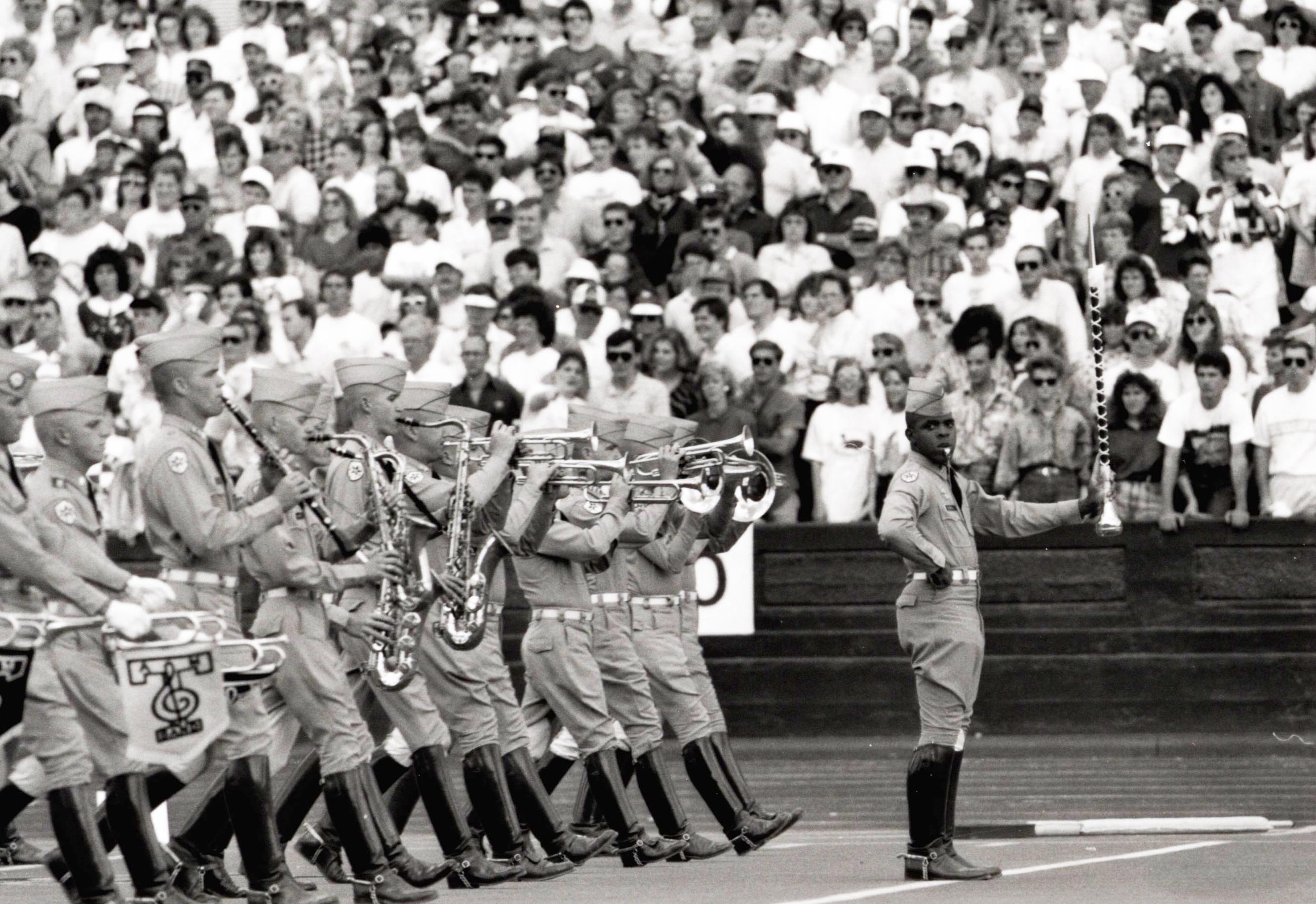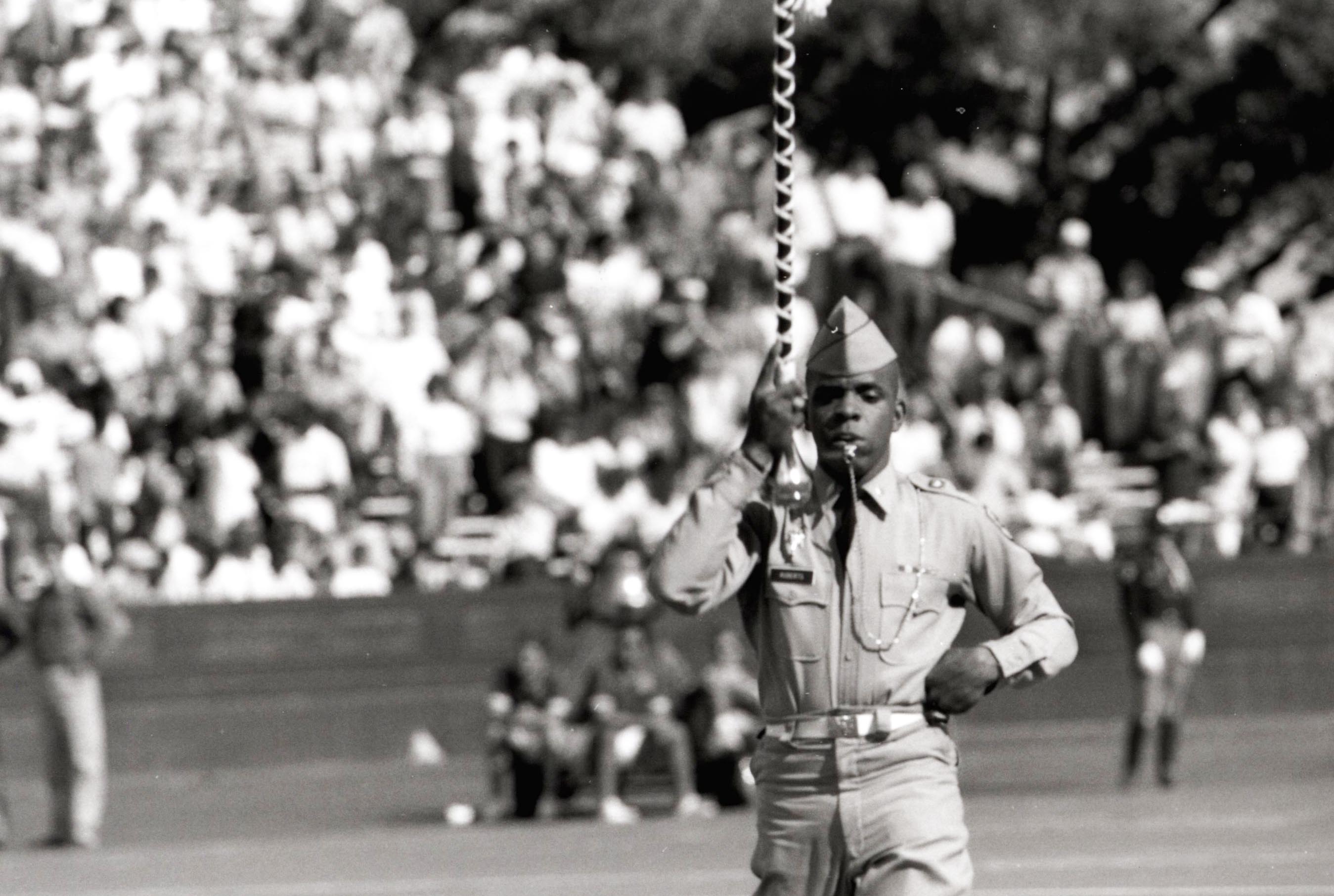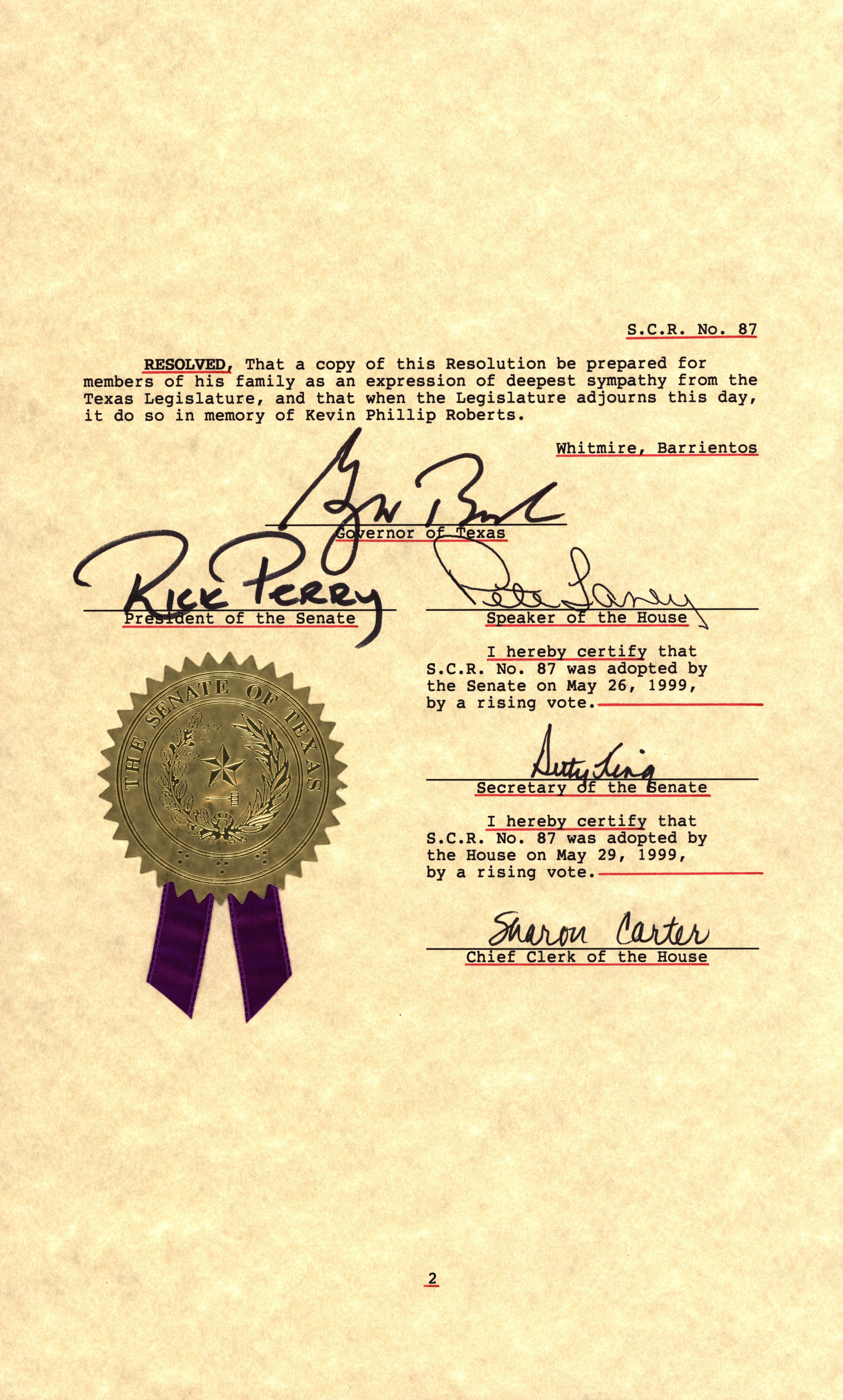Gone, but not forgotten: Kevin Phillip Roberts ’89
In honor of Black History Month, we remember the life and legacy of first African American drum major and College of Liberal Arts former student, Kevin Phillip Roberts.
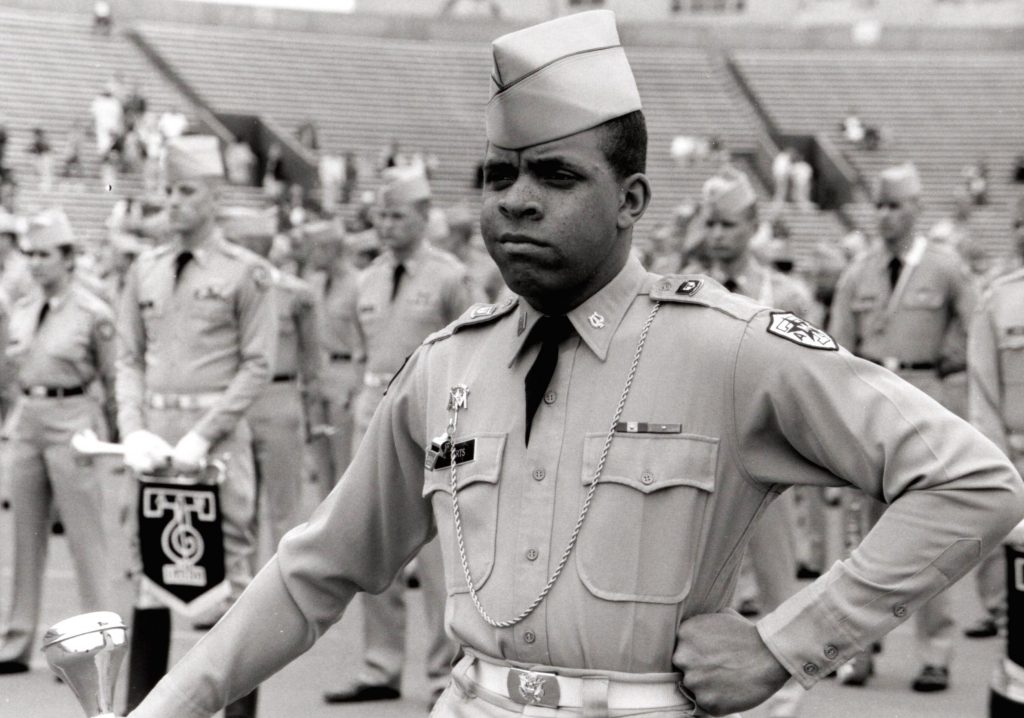
By Alix Poth ’18
Most of us want to be remembered. To know that our life meant something; to leave something good and true behind. To contribute a small part in history.
In his 31 short years, former College of Liberal Arts former student Kevin Phillip Roberts ‘89 was one who left a significant legacy. While he is known for being the first African-American drum major at Texas A&M University, what he is most remembered for is even more extraordinary: embodying leadership, dedication, and kindness.
Unafraid
Originally from Austin, Roberts began in higher education by studying economics at Texas A&M on a full scholarship. A member of the Corps of Cadets, he was chosen as the Infantry Band drum major for the Fightin’ Texas Aggie Band in 1988.
After two weeks of rigorous drills and competition, Roberts became the first and only African-American student to assume the role of drum major for the Aggie Band, one of its most prominent positions. Eighteen candidates tried out for the position, but only a few made it through preliminary tryouts. The process included directing the band to play the famous “Spirit of Aggieland,” and creating and leading drills on the field. Roberts was one of three juniors chosen to lead the nationally famous Aggie Band.
With a history of being a predominantly white university, to serve as the first African American in this leadership role took unwavering courage and confidence. Earning this prominent distinction was a tribute to the unmatched talent and spirit of Roberts.
Roberts considered it an honor to have been chosen. One of his main desires in leading as a drum major was to recruit more African-American students to the Aggie Band. According to an interview he gave to The Battalion, he believed “there [was] a need for balance,” and wanted to take action to change that.
Mark Fulton ‘89 remembers meeting Roberts as a freshman in the fall of 1985 and watching his persistence over the years.
“He exemplified how goals could be accomplished with determination and hard work, while maintaining a high level of character and support for the dreams of those around him,” Fulton said. “Maybe a little less understood was his quiet determination to accomplish well-defined goals that were important to him. His two biggest: Aggie Band drum major our senior year and flying planes after graduation.”
Undeterred
Roberts also held a long list of accomplishments — he was one of the first people to receive the President Achievement Award (a four-year scholarship to Texas A&M); he was a successful saxophonist and leader of Dukes Jazz Ensemble at Aggieland; and he was a member of Alpha Phi Alpha and Black Airline Pilots.
But Roberts’ lifelong dream was to become a pilot. He desired to fly in the United States Air Force and serve the country that he loved, but because of health concerns, this hope was left unfulfilled. Even still, he persevered after his dream and shifted his goal to instead become a commercial pilot.
Mark Connell ‘89, Lieutenant Colonel in the United States Air Force, knew Roberts their freshman year at Texas A&M and became lifelong friends after graduation when their paths crossed at an Air Force base.
“I found out he was pursuing his dream to fly by working on his commercial pilot license, while also acting in a local theatre troop. And if doing these two activities and having a full-time government job wasn’t enough, he also played his Alto Sax in a local band,” Connell said. “It was watching Kevin do all these things, even after 26 years, that I decided to never say ‘I don’t have the time’ to do something. He showed me if you want to accomplish something badly enough and enjoy life, you will.”
Roberts defined his objective and wasted no time between graduating from Texas A&M and pursuing what he most desired. Earning his professional pilot’s license in 1992 after finishing school, he spent seven years serving as a flight instructor training other commercial pilots, as an instructor for prospective U.S. Air Force pilots, and as a pilot for both cargo and passengers.
Unforgotten
Kevin Phillip Roberts passed away in April 1999 while doing what he loved most: piloting. Though his years were few, they were rich. Known as a devout Christian who modeled encouragement and strength, Roberts’ life is dearly remembered by all who knew him.
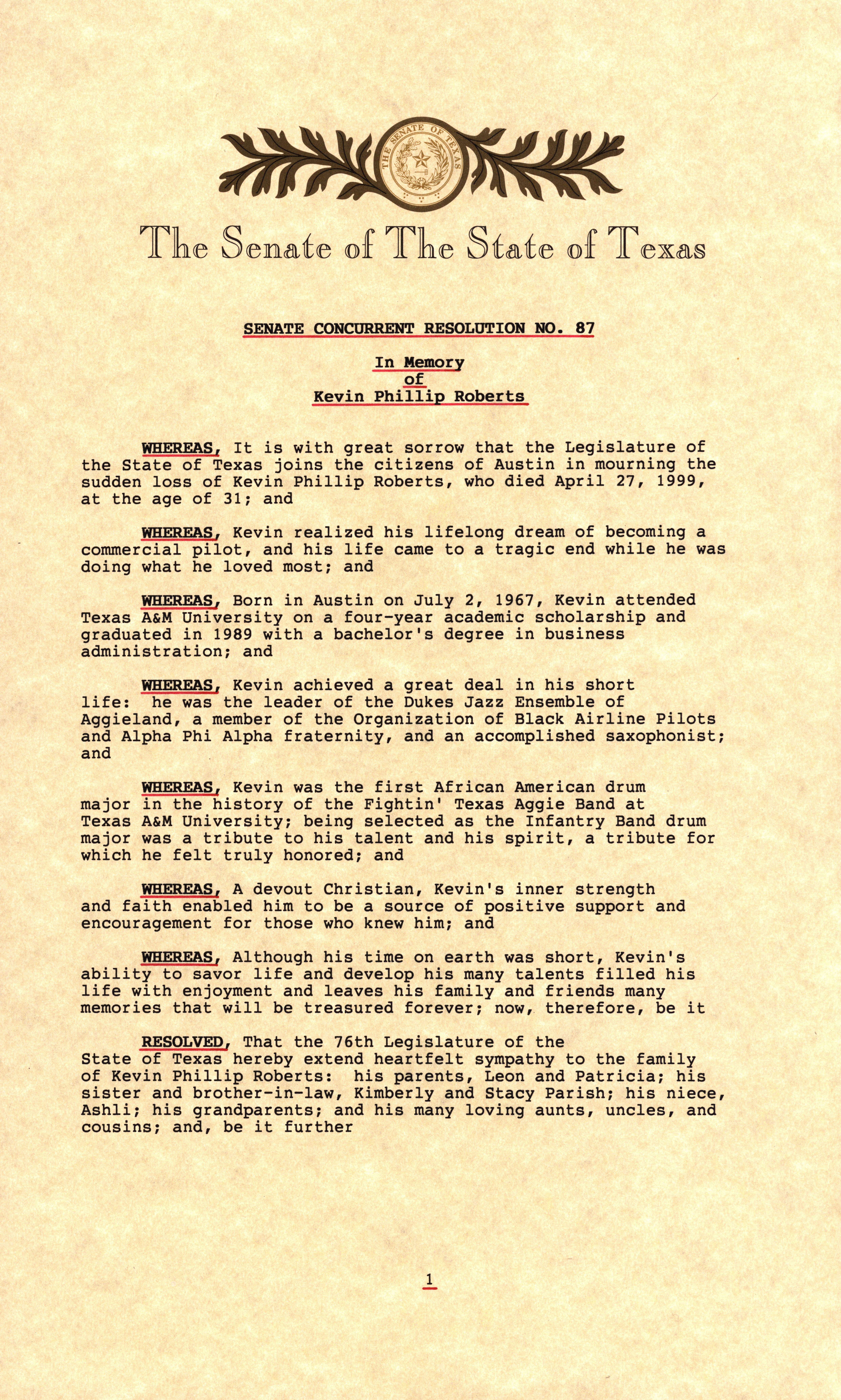
Senate Concurrent honoring the life of Roberts. Photo: Cushing Memorial Library & Archives, Texas A&M University.
“He was a person who cared about everyone and never said a bad thing about anyone. He bled maroon and white every day — he would chase someone down in an airport just because he saw an Aggie Ring and wanted to meet them,” Connell said. “His smile and positive attitude was contagious. He was my best friend after we graduated. We all lost a good one on this day.”
Because of the impact his life and memory made on others, two Sul Ross scholarships, given to deserving students in the Corps of Cadets with financial need, were established in his honor. The first was endowed by his parents in 2000 and the second in 2008 — and both have students being supported through his legacy to this day.
“With Kevin it was never about himself but instead the collective good. From day one, he possessed the biggest smile on campus and afforded a sincere kindness to all those he met,” Fulton said. “In a perfect world, if only for a little while, everyone should have a Kevin Roberts in his or her life. I was very lucky to have him as my friend.”
Roberts is an example that any amount of time, no matter how brief, is enough to make a profound impact — and it all depends on how you yield the opportunities given to you. Roberts held true to his character and his dreams, and with confidence paved new paths time and time again. All of us, like Roberts, are given one life to leave something worthwhile behind.
Roberts was not afraid: he was bold to defy the norm. He was not deterred: he persisted in what he felt passionately about. And because of all these things, he is not forgotten.
Originally posted here.

